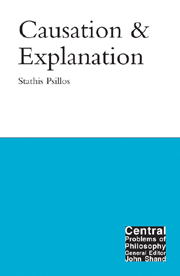6 - Laws as relations among universals
from II - Laws of nature
Summary
We have already seen that what underwrites the Humean RVL is a disdain for the claim that there are necessary connections in nature. Laws are nothing but contingent regularities plus something else, which distinguishes them from accidents. In this chapter, we shall examine some prominent attempt to show that there is some kind of necessity with which laws of nature hold. It should be noted from the outset that Humeans and many non-Humeans share the intuition that laws of nature are contingent. So some non-Humeans try to defend a notion of necessity which is compatible with the view that laws of nature are contingent. They call this contingent necessitation. Yet there has been a growing tendency among non-Humean philosophers to argue for a more full-blown account of necessity – metaphysical necessity – which makes laws necessary in a much stronger sense. In what follows, we shall have the opportunity to discuss both attempts to show that laws involve some kind of necessity.
From Kneale's skirmishes to Kripke's liberation war
RVL had been the dominant philosophical view for many decades. Not that there has always been unanimity about it. But up until the 1970s, the few dissenting voices were either not understood, or not taken seriously. William Kneale (1949), for instance, argued that genuine laws of nature differ from merely accidentally true generalizations in a substantial sort of way. Laws, he thought, are not Humean regularities, since laws – as opposed to accidents – hold with necessity.
- Type
- Chapter
- Information
- Causation and Explanation , pp. 159 - 178Publisher: Acumen PublishingPrint publication year: 2002

